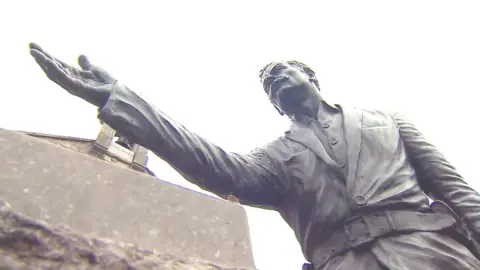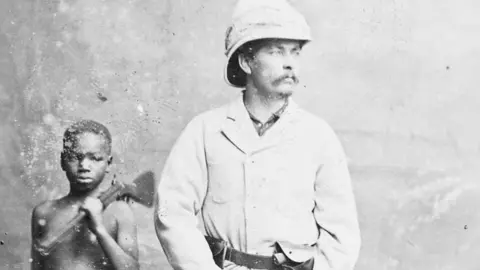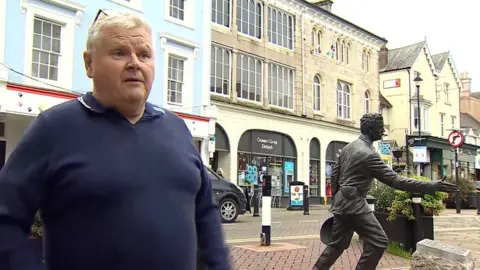HM Stanley: Denbigh votes on statue of Victorian adventurer
 BBC
BBCThe future of a statue in the home town of the controversial Victorian adventurer HM Stanley is being put to a public vote.
Residents in the north Wales town of Denbigh are being asked whether they want it removed.
Stanley became famous after finding missionary Dr David Livingstone in Tanzania in 1871.
But his reputation has been tarnished by claims of violence on explorations, and his role in the Congo.
He acted as an agent for King Leopold II of Belgium, and was seen as one of the architects who opened up the African region to the West, only for it to be brutally exploited after he had left.
The rule of Leopold II is said to have led to the deaths of as many as 10 million Africans, though historians dispute the true number.
A bronze of Stanley was approved back in 2010 by Denbighshire council, but even then proved divisive.
Amid widespread protests from the Black Lives Matter movement following the death of George Floyd in the USA, petitions were drawn up calling for the removal of a statue of Stanley in Denbigh and an obelisk honouring him in nearby St Asaph.
It was supported by the Bishop of St Asaph, Gregory Cameron, who said Stanley had "little respect for the natives of Africa".
As a result, Denbigh Town Council agreed to hold a public consultation on the statue, which had been delayed until the October vote due to the pandemic.
Gwyneth Kensler, a local county councillor, has long supported keeping the bronze on display outside the town's library.
"The people against Stanley are making all sorts of accusations. They are saying he was racist, he wasn't - he was cruel, he wasn't," said Ms Kensler.
"You have to put him in his context - the Victorian period. With Leopold - he knew nothing about the atrocities, and condemned them when he did."
She said the statue should remain where it is, to mark "Africa's greatest explorer".
 Getty Images
Getty ImagesStanley was born John Rowlands in Denbigh, but abandoned by his mother, and grew up in the workhouse at St Asaph.
He emigrated to America when he was 18, fighting in its civil war, before embarking on a career as a journalist and explorer.
It was in that role he famously searched for Livingstone, where he claimed he uttered the words "Dr Livingstone I presume" on finally finding him.
But not everyone shared the view that Stanley should be celebrated without question.

Denbigh resident Emyr Thomas said the bronze should be moved.
"It should be put somewhere, where you can read about it. We need to be able to show the next generation - and our generation - in an appropriate place.
"Then people can make their own minds up about it," he said.
Dr Marian Gwyn, head of heritage for Race Council Cymru, said the controversy surrounding Stanley was part of his story - and should be discussed.
"I'm not trying to defend Stanley, I'm just trying to be honest," she said. "It was a very violent time throughout - not only was that the environment in Africa, it was violent in Europe as well."
She said many Congolese people still saw Stanley "as a bit of a hero" who "broke the monolithic control of the African chiefs".
Dr Gwyn added: "It's a very different story to the one we normally hear. But I think we do need to know a lot more about what Stanley was doing over there."
The vote in Denbigh takes place in its town hall on Friday and Saturday.
The result, and what it means for the future of the statue, will be discussed when the town's council meets at the end of the month.